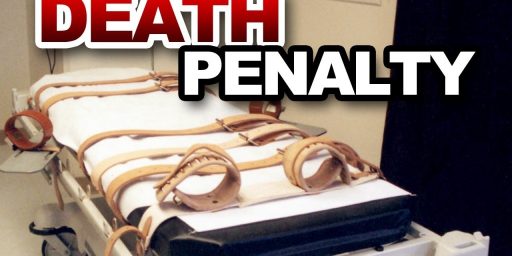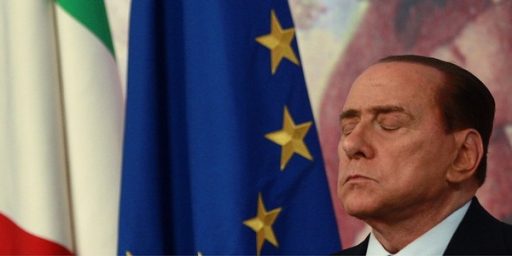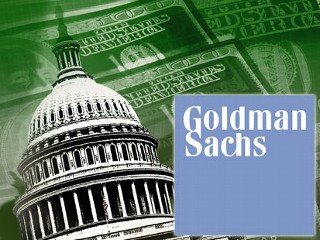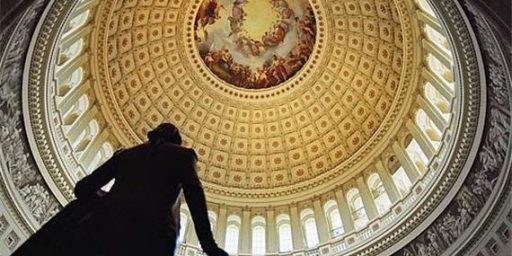The Root of the Financial Crisis Isn’t Government
Via Kevin Drum, here’s an IM conversation between Rahul Dilip Shah and Shannon Mooney, who are (were?) analysts at Standard & Poor’s. They were discussing the structure of some mortgage-backed securities S&P had been asked to rate.
RDS: btw: that deal is ridiculous
SM: I know right … model def does not capture half of the risk
RDS: we should not be rating it
SM: we rate every deal
SM: it could be structured by cows and we would rate it
Not exactly inspiring, is it? Here’s more on the actions of credit rating agencies in improperly rating mortgage-backed securities.
As mortgage delinquencies and defaults have skyrocketed over the last 18 months, it has become clear that the agencies that assigned high ratings to the securities that contained these loans severely underestimated their risks. Indeed, Mr. Waxman noted that S.& P. had downgraded more than two-thirds of its investment-grade ratings and Moody’s had reduced assigned ratings on more than 5,000 mortgage-backed securities.
[…]
Among the documents uncovered by the committee was an internal board presentation delivered by Mr. McDaniel to Moody’s directors in October 2007. According to the presentation, he told his board: Analysts and managing directors “are continually ‘pitched’ by bankers, issuers, investors.” At times, he conceded, “we drink the Kool-Aid.”
It’s stuff like this that irks me when both Democrats and Republicans each try to scream at each other to somehow take the blame for the current crisis. The fact of the matter is the root of this issue revolved around the risk of taking on these mortgage backed securities. Were it not for these securities, the increase in defaults in subprime mortgages would have had damages limited to the lending institutions involved, not the entire system.
Let’s face it: nobody in government was forcing any company to create these securities or to buy them. There were no regulations that forced financial firms to ignore the slew of economists who were warning that we were in a housing market bubble. There were no statutes forcing banks to buy mortgage-backed securities. There were no federal agents holding a gun to the head of credit rating analysts to give higher ratings to securities than they deserved. Big players in financial firms were gung-ho in taking on risky investments, and credit rating agencies were happy to play along with the charade that the risk wasn’t that bad.
Government didn’t have anything to do with that.






There is a reason they called them “Credit Default Swaps”… because if they had called them “insurance” (which they were) they would have been regulated.
And down the rabbit hole we went.
Like most disasters, there was a long chain of bad decisions. Partisans try to blame one or two links most associated with the other party. Those who wish to understand and prevent a similar occurrence (always fighting the last war arent we?) will keep in mind the timeline for these events and the international character of this crash.
This particular link is important as these were the pros who were supposed to assess the risk of these financial instruments. There was incompetence that was so pervasive that one wonders if there was fraud. If these guys had done their job properly there would have been no financial crisis. OTOH, if loan standards had not dropped, if rates had not been held so low so long, if leverage ratios had not been so high, etc.
Steve
This was an arms race. Nobody thought it was a good idea to make all these risky deals, everybody knew that it could put them out of business in the long run. But the fact was that if any one company didn’t play along, they got left behind, and could go out of business in the short term. Not many of them had the ability to survive being left behind long enough for those in front to collapse.
Underlying causes are greed and the baby-boom bubble. The Government certainly has no monopoly on greed, but it is sometimes an enabler or willing participant in greed driven activities.
Government had a clear role in creating this crisis. Either through action or non-action it made serious errors and created incentives that led us down this path. To flatly say government had no role is wrong.
I don’t think anybody has been making the argument that the government played no role, just that the government wasn’t the cause.
Every variable in a complex system plays a role in any given outcome of the system, but that doesn’t mean that every variable is equally responsible for the outcome.
Rodney: what you said. Plenty of blame for all. Long term stability was sacrificed on the altar of short term profit.
People were making so much money…
Back to Basics, Alex… From the SEC website:
Who created these troubled securities?
Government.
And the issue of course was ‘affordable housing’… something that the government put us all at risk to obtain. That’s the very reason those securities were created, and sold by the Government.
So… Where does the blame fall again?
Government!
Or is your argument to be that the fault of the investors was they trusted the word of the government?
Bithead… you need to read Alex’s post again.
The point isn’t the mortgages, or affordable housing. The point is about how bad loans that should have been simply a problem for lenders became a system-wide problem.
Your “explanation” does nothing to address the CDS issue which is right now paralyzing the entire financial system. And the CDS system was explicitly put outside the realm of government regulation.
Uh, no, I understand his post just fine, thank you.
Any downturn of such a scope will by nature be a system wide problem. And F&F, along with the ‘affordable housing’ bit, is the core of the whole thing.
Again… this crisis is the work of government. This is not a problem of too little regulation, this is a problem of too much governmental involvement.
Period. Full stop.
Are you still hung up on that?
Bithead,
I will merely quote myself:
Of course!
That IS, after all the root cause.
So, that IS, in fact your argument… that the investors shouldn’t have trusted the government? I’m sure there are some libertairians would tend to agree with you here… but that still doesn’t lift the blame off the government, sorry.
No sale.
Alex and Michael – save your breath. The lunatic fringe live in their own Private Idao alternate universe where the government and minorities are to be blamed for everything wrong in this world.
More on CDSs….
Did CRA result in the creation of over $62 TRILLION in dubious investments?
Bithead,
1) Government didn’t issue all of the MBS’s, nor, I might add, did they issue the RISKIEST of them.
2) Fannie Mae was not a government enterprise at the time–it was a private company.
3) Government had very little role in the credit default swaps that were impacted by the MBS collapse.
4) The bulk of the housing bubble collapse was in California and Floirda, and the bulk of the homeowners impacted were white and middle-class and therefore not impacted by the government programs you’re trying to blame.
5) Private lenders were much more heavily invested in the subprime markets than Fannie and Freddie were — by about 4 to 1.
6) Government intervention had nothing to do with the credit rating agencies providing AAA ratings to securities they knew should probably not have been given a rating at all (not even “junk” status, as noted in the article cited.)
7) Banks that chose not to dabble in the subprime, MBS, and CDS mess are doing fine (see e.g. BB&T).
Really, #7 was all I needed, but there it is.
This is not to say that government played NO role in the current crisis. After all, the mortgage-interest income tax deduction, which provides an INCENTIVE to buy a home beyond one’s means. But the players in the market who decided to ignore the risks of investing in CDSs and MBSs and the credit raters who played along bear the bulk of the responsibility for the mess they created. That’s capitalism. Markets don’t GUARANTEE good outcomes–they merely make them more likely.
The Community Reinvestment Act managed to exist from its inception in 1977 to the mid-90’s without causing much of a stir. However, beginning with intense HUD pressure on banks in the 90’s (including threats of criminal prosecution for redlining) the lenders began originating risky “subprime” mortgage loans in huge volume.
Professional lenders, understanding fully that these loans were going to be poor (economically, risk adjusted) assets very rationally desired to get them off their balance sheets. Enterprise being what it is, along came Freddie and Wall Street to accomplish just that. The horse was out of the barn; Pandora’s box was opened.
Subsequently, as the debacle festered like a cancer, efforts to address the problem (a definitive report was put out by the relevant regulatory agency in 2003 and regulatory proposals proposed by the Bush administration) Congressional hearings were conducted in which the regulators were mercilessly badgered and accused of fear mongering by the likes of Barney Frank and Maxine Walters. (You can see the actual C-Span tapes of the hearings if you desire to go find them. It was a mockery.)
How one could conclude that this situation is not a classic case of the unintended consequences of government driven social engineering, and the abysmal failure of Congress to act upon the regulators warnings, is beyond me.
Not exactly, Alex. It was a hybrid. It was government-sponsored. And it issued stock as a private company. Never purely private.
In my view that itself was a problem.
Today from the Associated Press:
Former Federal Reserve Chairman Alan Greenspan, describing the current financial crisis as a “once-in-a-century credit tsunami” acknowledged Thursday that the crisis has exposed flaws in his thinking and in the workings of the free-market system.
Greenspan told the House Oversight Committee that his belief that banks would be more prudent in their lending practices because of the need to protect their stockholders had been proven wrong by the current crisis. He called this a “mistake” in his views and said he had been shocked by that.
Greenspan said he had made a “mistake” in believing that banks in operating in their self-interest would be sufficient to protect their shareholders and the equity in their institutions.
Greenspan called this “a flaw in the model that I perceived is the critical functioning structure that defines how the world works.”
“A credit default swap is a contract between two people, one of whom is giving insurance to the other that he will be paid in the event that a financial institution, or a financial instrument, fails. It is an insurance contract, but they’ve been very careful not to call it that because if it were insurance, it would be regulated. So they use a magic substitute word called a ‘swap,’ which by virtue of federal law is deregulated.”
Michael Greenberger, a law professor at the University of Maryland and a former director of trading and markets for the Commodity Futures Trading Commission.
The government had nothing to do with the “creation” of these securities, and I have no idea by what force logic you came to that conclusion.
Well, are we talking about the CRA as originally signed by the Peanut Farmer, or are we talking about CRA as modified by the Clintons? Drew addresses that one very well. I advise everyone read his comments again.
Second half of the question, though can be answered by looking at the total value of bad loans provided under the CRA as modified. Comong to that level of money isn’t all that hard.
Read again from the quote from the SEC site, Alex. They did in fact issue most of them,ttheir words not mine… and given the corruption at Fannie Mae, the riskiest, as well. Sorry. (Trouble of course is who figured a GSE would be so risky? Again, who could see past the government induced market distortion?)
Schuler dispatches that one fairly well. I can only add that they were a private company in name only.
Well, again, given the government caused distortion in the market, how does one make such judgements? And clearly given the overt threats of criminal prosecution, the loan’s value wasn’t the only consideration in protecting the shareholders, huh? You can hardly blame Bank officers for not wanting to cause lawsuits.
Again, from Drew:
So much for the claim:
“nobody in government was forcing any company….”
Nor am I suggesting that goverment was the sole player here. What I have been saying right along is that they are the ones directly to blame because of their manipulation of the market. Absent that manipulation, the other problems would have been survivable.
The fault is government.
I’ve seen Bithead post elsewhere.
Ignore him.
He is never confused by the facts.
In their zeal to apportion blame, and to inflict a direct hit on fellow commentator’s foreheads with a rotten tomato……I detect much selective fact, logic and authoritative quoting here.
I tend not to “pull rank.” But in a prior business life I was a lender at a bank. I can tell you unequivocally that subtle pressure was put on banks by regulators to meet CRA requirements. However, it was subtle. That changed under Andrew Cuomo’s stewardship of HUD in the nineties.
Why? Well, who could argue with the goal of home ownership? And of course the economic environment at the time was good. So HUD pressed hard for origination of risky loans. And banks complied; and believe me, banks are good at loan origination. But….they also began seeking ways to dump these risky assets off their balance sheets. I would argue that to do otherwise would have been, from a fiduciary point of view, malpractice.
If memory serves me correct, the first issuance of mortgage backed securities (a packaged portfolio of mortgage loans purchased from banks by myriad institutional investors) was conducted by Bear Stearns in 1997 or 1998. And of course the heavy lobbying of Freddie to buy loans is well documented.
So as I noted, Pandora’s box was opened, with all kinds of natural permutations of behavior by all kinds of players. And this gives rise to all the bickering I see on this comment thread. But make no mistake – this was all set into motion by government policy.
Engineering structures have all sorts of mechanisms to halt progressing catastrophic failure. Government? Yes, but not so effective. So was there a chance to stop this? As I noted, the regulators called out Fannie and Freddie. But the response was stunningly bad.
For those desiring to understand the actual Congressional oversight response, rather than just hurling invective, the C-Span tapes I referenced are fascinating. On an almost straight party line split the Democrats simply throttled the poor regulator trying to make the case to address this issue. The same Democrats (see: Barney Frank) claiming to be the solution today. Incredible.
And dare I say it? Obama, despite his claims, was nowhere to be found on this issue once he entered the Senate.
There is plenty of blood on people’s hand on this issue. But at its root, this is a monumental failure of government. We fail to recognized this at our peril.
DC Loser:
“Alex and Michael – save your breath. The lunatic fringe live in their own Private Idao alternate universe where the government and minorities are to be blamed for everything wrong in this world.”
It’s seventy years since the Great Depression, and the right is still both blaming it on FDR and p*ssed about the New Deal.
For the rest of our lives, we’ll see right-wingers claiming that the Crash of ’08 (hopefully, not the Depression of ’08-whatever) was the fault of the government and Evul Librulz.
Okay, but who was heavily involved in MBSs and when did they get their start? Hint it was a pretty long time ago.
And here is something from the SEC’s website,
You’ll do much better not to read Drum when it comes to economics, the man is hopelessly clueless.
Epic fail Alex.
No, just up to 2003 they issued the majority of them.
As Dave has pointed out it, and Freddie were GSEs. Also Ginnie Mae issued MBSs and that was a government agency.
Government deregulated that market in 2000. Bill signed by Bill Clinton and passed with lots of Republican votes.
True enough, but the CRA was the umbrella underwhich many of the changes took place.
Actually I’d love to see the data on that. Fannie and Freddie were getting into that end of the business quite a bit near the end since it was getting harder and harder to find buyers.
Tricky since Ginnie Mae is a government agency and Fannie and Freddie are implicitly backed by the government and could borrow from the government. The take over of the latter two by the government says this statement while maybe technically correct really isn’t.
No suprise there, but this doesn’t really help your claim since MBSs were government created, government promoted, and often times government backed.
Drew: You seem to know a fair amount of what you are talking about, can you direct me to some relevant documentation?
The problem I have, is people keep saying things like the above (intended or not) which seem to imply that gov’t makes policy in a vacuum. It doesn’t (and I know you don’t think so, Drew)
For instance:
Yes it was stunningly bad. But you neglect to mention the “why”. Because Fannie and Freddie fought tooth and nail to keep their privelaged status (for instance, being able to keep their capitalization at 10% instead of 20% like all the rest of the banks). And other banks where doing the same thing. They all had high powered lobbyists working capital hill.
Again Drew, I agree but… Government does not work in a vacuum. And that too, is a peril.
ps: You bring up Obama, so I feel the need to ask, who has a high powered lobbyist who spent years collecting money from Fannie/Freddie (only one of the 2 if I recall correctly) until just 2 months ago, and this man is in his campaign’s inner circle? Here’s a hint: His initials are NOT BO.
pss: I am sincere about the links Drew, I am trying to wrap my head around this mess.
Actually it was 1970 by Ginnie Mae. Bear Stearns may have gotten it really going in 1997/1998, but it was a creation of a government agency. See my post currently at the top of OTB.
Incidentally the data there shows a big jump in non-government MBSs in 1995…close to your 1998.
Heh. So, you healed up OK, I take it?
None of these explanations account for the international nature of this mess. As I remember, correct if wrong, the subprime loans were being securitized and sold before Fannie and Freddie were allowed to buy them. Fand F had to have the rules changed before they could get into the subprimes. Once they got in, they became the dominant player.
The mortgage originators were making big dollars. Countrywide was flying. In my experience with money matters, making money is the biggest incentive.
Steve
Mortgage backed securities are used in other countries as well, and they can be held by foreign banks and investors.
Try again.
Fannie and Freddie have overseas branches?
Steve
Since when is the world’s economy not tied to what happens here?
And anwyay, aren’t SBC’s sold to investors outside the US?
Tom P
For 18 years I have been in the lending and private equity world. As such, I simply have been in and around Wall Street and picked things up. So, no, I don’t have specific links for you. Sorry. You can also see from Steve Verdon’s comment (on MBS’s) that without definitive research I can get things directionally correct but technically wrong.
I’m not sure I follow your “govt not in a vacuum” reference. The point I was making relates to human and organizational behavior. HUD put into motion a policy initiative (CRA/emphasis on home buying) and put its weight behind it. What ensued? Banks, being pressured to make bad loans naturally sought a venue to offload them – hence Freddie and Wall Street packaged securities. What next? Well, all the sudden any loan originator sees the opportunity to get a fee for origination and then sell the paper, and the risk, off. Then exotic loan terms are invented to make origination easier to keep the machine grinding. Naturally, lobbyists for Fannie and Freddie – now very lucrative enterprises – seek to protect their turf. And on and on it goes. Next thing you know you’ve got a really wicked web.
The only points I really think are important are these: 1) This whole mess started with social engineering in Andrew Cuomo’s/Clinton’s HUD, so be careful what you start and 2) entrenched interests (Barney Frank et al) prevented the regulators from throttling this down. Skip the Republican vs Democrat politics for a moment. What I just said is absolutely true. It was a classic example of terrible and irresponsible governance and it is having terrible consequences for many people. If there was any justice in the world Barney Frank would be put on trial.
A shame.
Tom P
I forgot to mention – you can probably find the C-Span film footage I was referring to by going their website and searching archives.
The hearings were in 2004 and related to OFFEO’s scathing report and the whole issue of Franklin Raines and the accounting problems at Fannie.
You could search on: Barney Frank, Maxine Waters, Greg Meeks, Lacy Clay and Artur Davis. The tapes are fascinating – all of them variously accusing OFFEO Director Falcon of incompetance, being on a witch hunt, scaremongering etc etc
Its a grotesque display.
Congratulations you win today’s award for being deliberately obtuse.